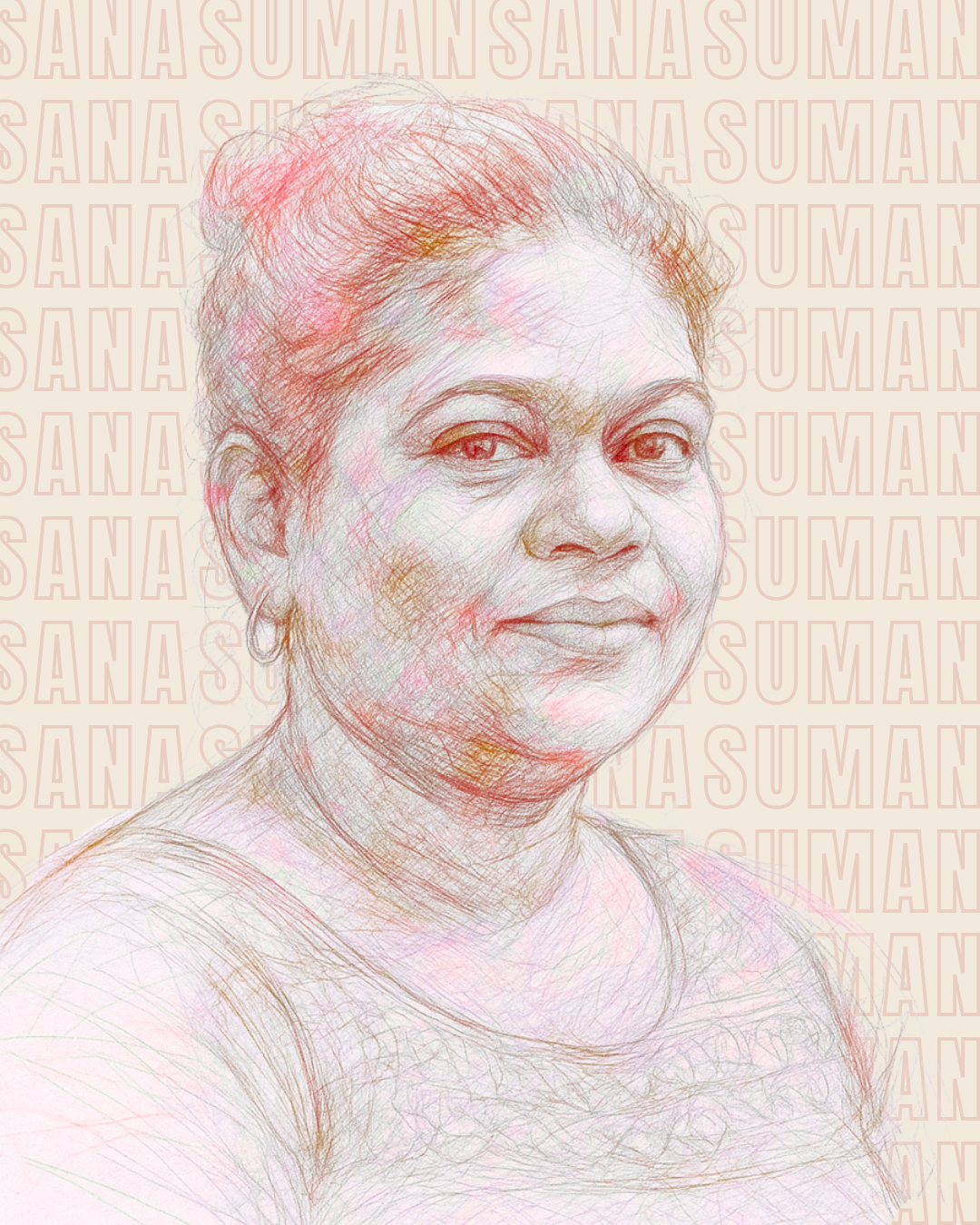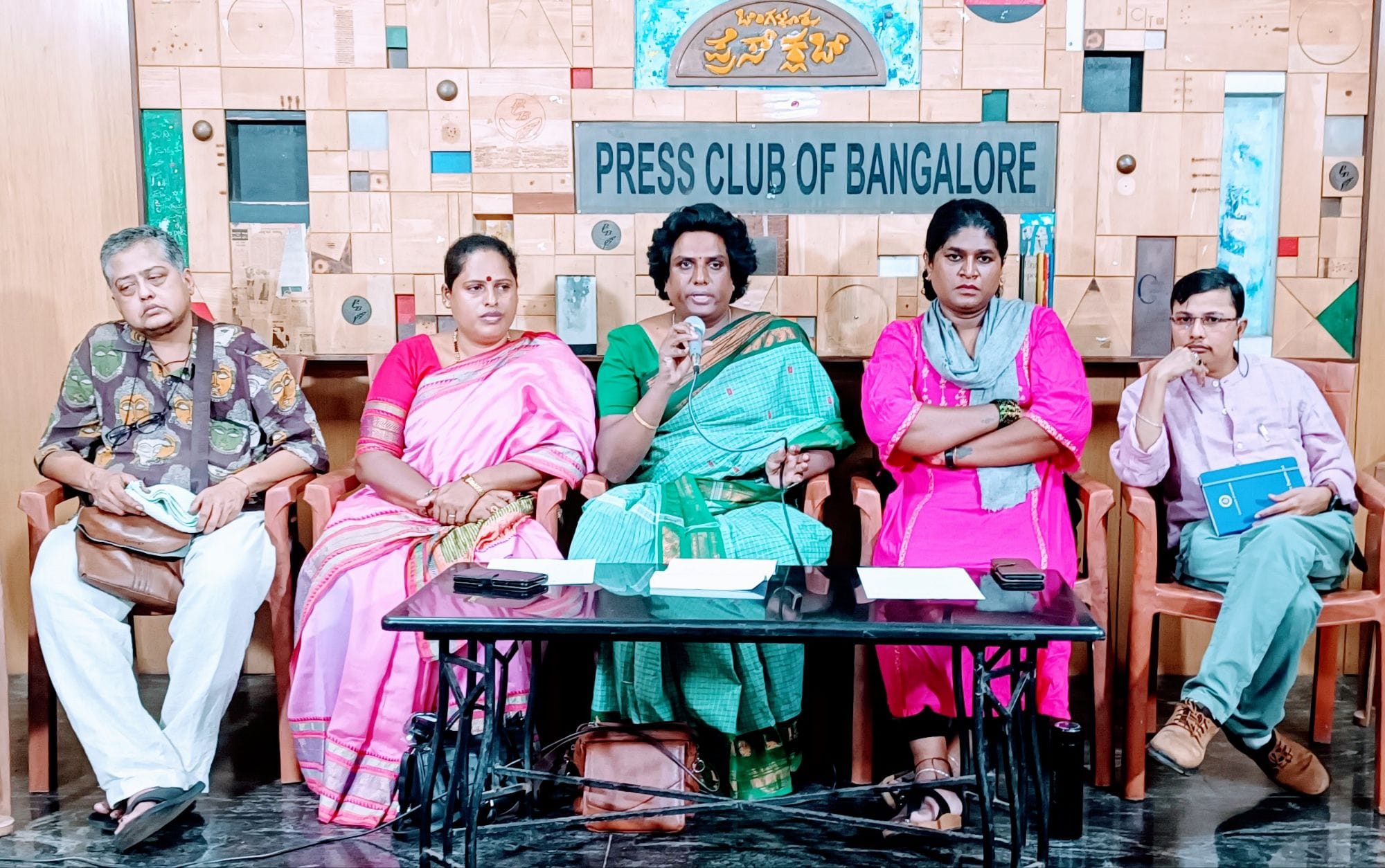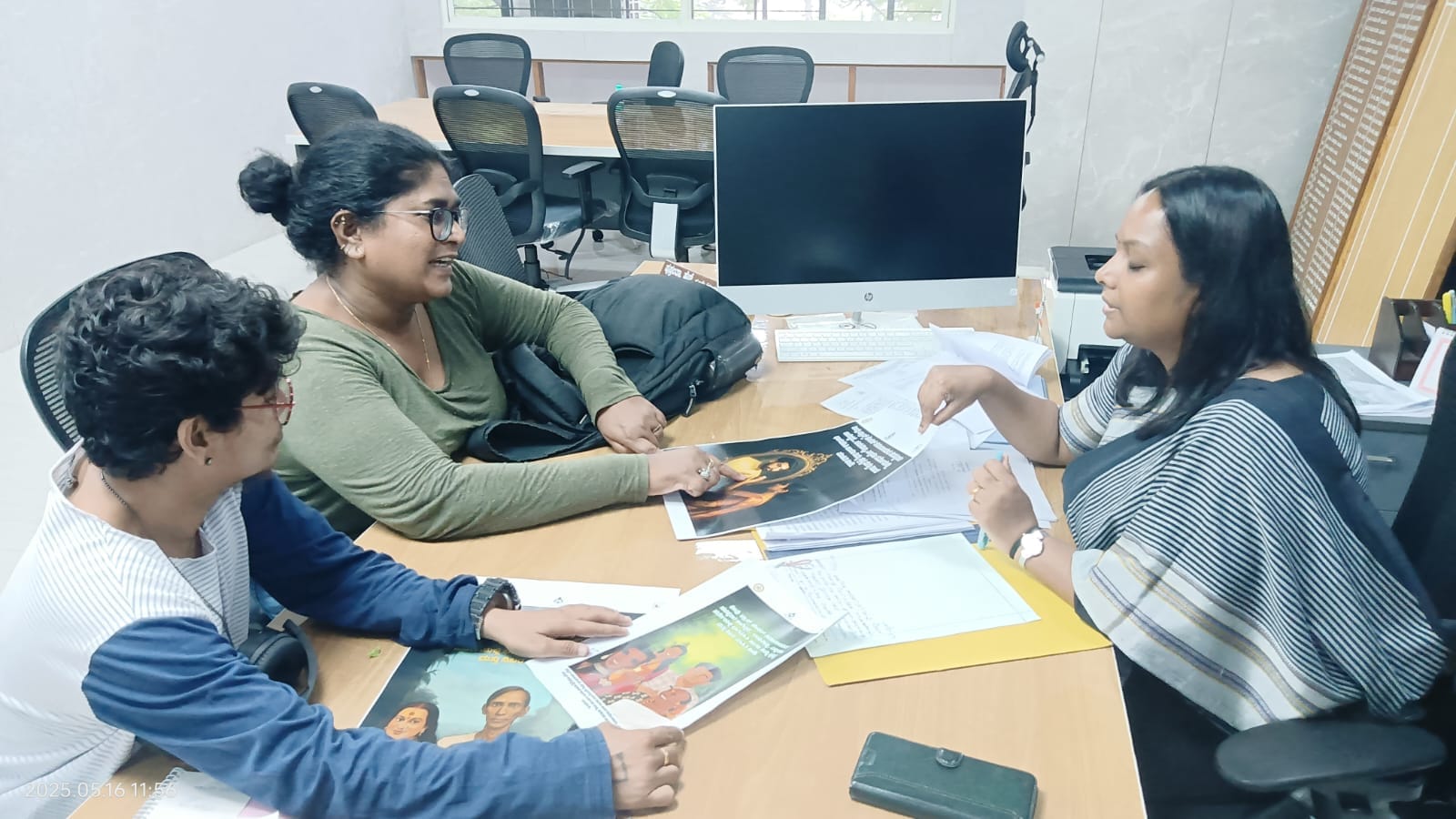From Silence to Strength
Sana Suman is a trailblazer in India’s trans rights movement, known not just for her powerful activism but for her personal journey of resilience. Read the full interview here.

Published by Bhavya Sangal - June 8, 2025
Forced out of her home at a young age, Sana endured social rejection, institutional violence, and discrimination. From surviving conversion therapy and police brutality to navigating life as a sex worker, she emerged as a fearless voice for her community.
After completing her Masters in Journalism from St. Joseph College, Sana realized that the trans community’s biggest needs were family acceptance and employment. In response, she founded Swatantra, a grassroots organization that supports over 3,000 transgender individuals across India with access to healthcare, legal aid, education, and employment opportunities. With Swatantra, she envisions a future where every transgender person is not just seen but respected, supported, and celebrated.
Despite facing setbacks, Sana continues to lead with strength, proving that empowerment is not about fitting into society’s norms, but about rewriting them.

Many people know your story from the media, but what is one aspect of your journey that has not been told yet?
Many people have heard my story through the media, but there is one chapter of my life that remains largely untold—my love story.
During my time as a sex worker, I met a man who was one of my clients. Unlike others, he seemed genuinely touched by my journey. He showed concern for me, cared for me, and provided the support I had been missing since leaving home. Over time, our connection deepened, and we spent four years together. I believed it was love. I believed he was my home.
But when I asked him about marriage, everything changed. He told me he wasn’t ready, then, just three months later, he married another woman. That moment shattered me. If four years of love and companionship weren’t enough, then what was? I soon realized that I had simply been a temporary shelter for him - emotionally, physically, and even financially. It was a painful truth to accept.
Heartbroken and disappointed, I fell into months of depression. My mind was consumed with endless questions, self-doubt, and darkness. But with time, I found clarity. Today, he is married and has a daughter. And me? I hold no grudges. In fact, I’m grateful. Had I stayed with him, I would have lost myself.
That experience, as painful as it was, became the turning point in my life. It gave me self-confidence. It made me stronger. And most importantly, it taught me that I don’t need someone else to complete me. I am enough.
What has been the most unexpected or overlooked challenge in your activism for trans rights?
Over the years, I have witnessed a growing acceptance of the transgender community. There is more visibility, increased awareness, and a shift in public perception, perhaps due to continuous activism, media representation, and educational efforts. However, despite this apparent progress, a significant and often overlooked challenge remains: the way inclusivity is practiced, particularly in workplaces.
Many organizations and companies have started hiring transgender individuals, but often, this is done out of sympathy rather than genuine acceptance. Inclusion should not be about fulfilling diversity quotas or showcasing corporate social responsibility. It should be about creating real opportunities for growth and development. Unfortunately, what I see today is that while trans people are being hired, they are rarely given opportunities to advance in their careers.
Within the transgender community, growth follows a structured path - one is first a daughter, then a guru, and eventually a mother. But within corporate structures, there is suppression rather than growth. A transgender person may enter a company at a certain position, but there is often no path for progression. Companies provide initial support for three to five years, after which many trans employees are left behind, forcing them to return to sex work to sustain themselves.
The fundamental issue is that companies hire trans employees because they need human resources, not necessarily because they genuinely want to empower them. Many organizations take pride in their diversity initiatives, but the real question is: Are transgender employees being given the chance to move forward? Are they being promoted, mentored, and equipped with the skills needed to climb the corporate ladder?
There is little to no tracking of the progress of transgender employees. Companies must analyze key metrics: Where do these employees stand after five years? What challenges are they facing? What additional support do they need to succeed? Unfortunately, this kind of accountability is largely absent.
For a trans person to truly thrive in a professional environment, they need an enabling atmosphere - one that includes proper training, ongoing mentorship, and clear pathways for career advancement. Without these, they remain stuck in the same roles with minimal salary increments and no real progress.
A close friend of mine has been working as an administrative associate for six years. Despite her dedication, she remains in the same position, with only a 10% salary increase over the years. When I asked her to rate her professional growth on a scale of 1 to 10, she said she was only at level 2:
1 - She got the opportunity.
2 - She learned the work.
And that was it.
She confided in me that if she had remained in sex work, she would have earned much more and had greater financial security. But she continues in her current job, earning ₹25,000 per month, because she fears that leaving would mean losing even this limited stability. There are no alternative job opportunities, and she feels trapped in a cycle with no way forward.
This is the harsh reality that many transgender individuals face. Hiring trans employees is just the first step; true inclusion means ensuring that they have the same opportunities for growth, promotion, and success as anyone else. It is time for companies to go beyond symbolic diversity efforts and take real action to uplift the transgender workforce.
As a visible figure in the trans rights movement, do you ever feel the burden of representation? How do you navigate that pressure?
Absolutely, the burden of representation is something I feel deeply. Within the trans community itself, there can be a sense of competition, which makes representation even more complex. It’s not just about being a voice - it’s about being an inclusive voice.
Trust within the community is crucial, but it’s fragile. When there are delays in action or fulfillment of promises, that trust can easily erode. Moreover, when a government body or any other sector approves a scheme, policy, or demand, it often ends up benefiting only a select few. What about the rest of the community?
My intention has always been clear - every member of the trans community should be able to benefit. True representation means ensuring that no one is left behind.
Was there a moment in your journey where you felt like giving up? What pushed you forward?
(chuckles) I’ve faced a lot of pressure, but giving up was never an option.
There has been plenty of discouragement and attempts to undermine me. One recent example was when I was elected to the Transgender Karnataka State Committee Member, following the 2015 Supreme Court guidelines. The community largely believed I was a suitable candidate and I genuinely wanted to represent everyone. But sadly, there were some so-called activist leaders from within the community who were not happy with my selection. They began countering my work and questioning my position.
It was disheartening. I felt disappointed, not because of criticism, but because I was stepping into this role to speak on behalf of the entire community, not just a specific group. I even lost a close friend over this. They distanced themselves because they were more focused on the position itself than the person in it.
It’s painful when ego and personal ambition take precedence over collective welfare. That was one of the most difficult moments for me. Still, I chose to stay because the cause is bigger than the conflict.

If you could implement one systemic change in India today that would transform trans lives, what would it be?
Reservation in employment and education including in the private sector is absolutely essential. Without it, moving forward becomes incredibly difficult for our community.
The private sector is a massive space with vast opportunities. But let’s take an example: if there are 100 people in the trans community and only 10 get hired, what happens to the remaining 90? True inclusion means thinking about everyone, not just a token few.
Job security is key. Even if it’s symbolic at first, that sense of stability gives people confidence, a belief that they are supported, not just temporarily, but for the long haul.
Unfortunately, most companies today hire trans individuals on a contractual basis. As a result, many drop out due to the lack of security and stability. This is not sustainable. Until there’s real, structural support through reservation and long-term employment, true progress will remain out of reach.
Society often defines success in conventional ways. How do you define success in the context of your activism and personal journey?
To me, a truly inclusive society is one where every individual regardless of their profession lives with dignity and feels a sense of success and satisfaction in their life.
Whether you are a doctor, an engineer, or even a sex worker, your work should be respected, and you should be able to take pride in it. It’s not about status, it’s about dignity.
Take the example of a gardener. If they are happy because they love tending to the garden, enjoy the smell of the flowers, and find peace in caring for the plants - that is success. That is dignity. Even something as simple as selling fruits can be a dignified and fulfilling livelihood, if it brings joy and purpose.
We need to move away from the mindset that happiness and self-worth only come after reaching a certain position in society like becoming a doctor or holding a prestigious job. True empowerment comes when people are allowed to be who they are and feel proud of what they do.
What is one piece of advice you would give to a young trans person struggling with their identity in India today?
My sincere advice is: focus on gaining education and building knowledge. It doesn’t mean you have to pursue the highest levels of formal education but developing skills is essential.
Find one area where you can excel, and become an expert in it. Whether it’s a craft, a trade, a profession, or a creative pursuit - be confident in your abilities. Skill development can empower you, give you independence, and help you build a life of dignity.
Knowledge is power, and in a world that often questions your identity, it becomes your strongest tool.
How do you see trans rights intersecting with other social justice movements in India, such as caste, gender, and economic equality?
Trans rights are deeply interconnected with other social justice issues in India. There’s both horizontal and vertical discrimination at play.
Personally, I have faced discrimination not only for being trans, but also because of my caste, skin color, and gender. These layers of identity don’t exist in isolation; they overlap and compound the challenges we face.
Even within the trans community itself, there is a hierarchy, a distribution of power and privilege, which leads to internal discrimination as well. So while we fight for inclusion and equality on the outside, we must also address the inequalities that exist within.
Real progress can only come when we recognize and tackle all these intersecting forms of injustice together.
Is there a particular story of someone you met during your activism that still impacts you deeply?
Yes, there was one experience that has stayed with me forever.
When I was 24, I met a trans woman who was around 28 or 30 at the time. She was incredibly beautiful, so much so that people often didn’t even realize she was a trans person. She was engaged in sex work and had been diagnosed with HIV. She had no family support, no job opportunities, and lived in constant oppression.
Despite everything, she used to say, “I will not worry. I am happy.” But over time, her condition worsened. The disease spread throughout her body, and she became very weak. The stigma surrounding HIV was so intense that the community itself rejected her. She was literally abandoned, left to survive in dark and shallow corners of the city.
One day, she passed away - alone and unseen, in a bush. No one noticed her absence for three days. By the time her body was found, it had started decomposing. Dogs and flies had begun eating her remains. It was heartbreaking. No one deserves to die like that, not even an enemy.
My friends and I took her body to the local authorities. Her parents refused to claim her, saying they had no relation to her. Eventually, the local municipal corporation took custody of her remains.
That experience shook me. It made me question: what kind of society are we living in, where there is no humanity left for someone so vulnerable, so forgotten?

If you weren’t an activist, what would you be doing? What are your dreams beyond the fight for trans rights?
(Chuckles) I’ve always been very good at science. My dream was to become a doctor and honestly, that dream still lives in my heart.
If I ever get the opportunity to pursue it, I would still be very willing to become a doctor. It’s a dream that never really faded, despite everything else I’ve taken on.
When you first realized that your identity didn’t align with what your family expected, what was the hardest conversation you had with them?
They didn’t just reject me, they literally threw me out of the house. There was no acceptance, and at that time, I wasn’t even able to explain or help them understand who I was. I was very young, and what followed was a period of intense hardship and emotional torture. It became nearly impossible to maintain any kind of amicable relationship with them.
And how are things with your family now?
My parents are no longer alive. I do have siblings, but they are busy with their own families and lives. Right now, it doesn’t feel like the right time to try and rekindle that connection.
What is a memory from home that still lingers in your mind - one that brings both pain and strength?
Yes, absolutely. I remember being invited to my own sister’s wedding; my mother had called me, and I felt so blessed and pleased to be included in such a special occasion. It meant a lot to be remembered and welcomed.
However, there was a condition. She asked me to wear a burqa and cover myself so that others wouldn’t notice my identity. That moment was painful. Because while being invited is a gesture of inclusion, asking someone to hide who they are takes away the very essence of that gesture.
It made me feel that if I have to hide myself to be part of a family celebration, then what’s the point of being invited at all?
Was there ever a moment when you thought your family might accept you? If yes, what changed? If not, how did you cope?
Yes, I experienced that when my articles started getting published and I received media coverage after meeting the Chief Minister of Karnataka and other ministers like Shobha Karandlaje. That visibility brought a moment of change; my mother called me and spoke to me about everything. It was emotional.
It made me realize that when you are seen doing something socially respected, like having a job or being in the media, there’s a chance for acceptance. This is the harsh reality: if trans children are seen begging or engaged in sex work, acceptance from their families is extremely rare.
Recognition, unfortunately, often comes only when society validates your worth.
Being placed in a mental hospital for simply being yourself is unimaginable. What was the single most terrifying moment for you there?
When I began expressing myself in a more feminine way, my family thought something was seriously wrong with me as if it were a disease. They first took me to a church, where the priest performed a kind of ritual procession. At one point, he even beat me with the Bible, believing it would “cure” me.
Eventually, they took me to a hospital, hoping for a medical solution. But the doctors and medical professionals weren’t trained or informed about gender identity. They didn’t recognize or understand what it meant to be transgender. As a result, they gave me a completely wrong diagnosis, prescribed incorrect medications, and subjected me to harmful treatments including shock therapy.
Those medical procedures had a lasting, negative impact on my body and mind. Instead of receiving care and support, I was punished for being who I was. That kind of mistreatment leaves deep scars and unfortunately, it’s not uncommon for people like me.
Were there people inside like doctors, nurses, or even patients who showed you kindness? How did that affect you?
It wasn’t possible to interact with anyone. My parents controlled the entire situation. They wouldn’t let anyone come near me; they used to tell others that their son was mentally ill and that people should stay away and not speak to me.
And I was just a child back then. I didn’t have the courage to speak up or go against them. So whatever they said or did, I simply followed. I had no voice of my own at that time.
Did you ever feel like you were losing yourself inside that place? How did you hold on to hope?
There were many times when I truly believed I wouldn’t survive; that somehow, these people were going to kill me. That was the only thought I held on to. I was just a small child, completely unaware of the world outside; I didn’t know about movements, activism, or that people were fighting for rights. I knew nothing about the law or support systems.
In my innocence, I used to think: One day, I will meet God and ask Them to take this body away and give me the body of a girl so that I don’t have to suffer like this in society.
And if you think about it now; well, here I am, living a content life in a girl’s body… just not in heaven! (laughs)
Many trans individuals face cruelty from law enforcement. Can you describe a moment with them that shook you to your core?
When I was involved in sex work, I faced a great deal of harassment. The police often filed false complaints against us. There were times when they would chase us down, and we had to hide to avoid being caught.
Once, after I had undergone breast implantation surgery, I wasn’t able to run or even walk quickly. The police caught me that day. As I tried to move forward, they pulled my hair so hard that I fell to the ground. They dragged me along the road, treating me like a dead dog, my body scraping against the rough surface.
When they finally made me stand up, I started bleeding from the scalp due to the pressure - my hair was plucked out. My hands were swollen, and my breasts were bleeding. Yet, the police didn’t take me to the station. Instead, they warned me to run away or face worse violence. They said, “Idhar khade rahoge to aur maarenge” - if you stand here, we will beat you more.
I couldn’t even file a complaint because I had no choice. The very next day, I knew I wouldn’t be able to stand from the injuries.
After all those years, do you think there is any change in the law enforcement and their officials?
I’ve realized that if you present yourself well; wearing a suit and boots, for example, you are treated differently than someone from an underprivileged background. The reality is, the system favors those who appear to have status.
The laws themselves need to change. There are specific laws protecting women and children, but we need clear, articulated laws that include transgender people, covering areas like domestic violence, sexual assault, and child protection. Even child protection laws should explicitly include trans rights.
The law needs to be rewritten with proper representation from our community.
Now, after having gone to law enforcement many times, I don’t hold much hope in the people themselves. I know how they behave and the kind of “justice” they deliver. But I do know the law better now, and I am prepared to speak up for our rights.
If you could go back in time and stand in front of your younger self in that hospital, what would you say to them?
I would say, “Treat yourself kindly.”
At that age, of course, you’re completely under your parents’ control. You’re dependent on them for everything, for food, shelter, survival. Without knowledge or exposure, you can’t even imagine a different life. If children grow up in a supportive and open environment, they naturally learn and mature faster. But for someone like me, coming from a background of suppression, the struggle is much harder, and maturity comes much later.
But with the knowledge and experience I have now, I’d tell that 10-year-old version of me: Stop. You have everything within you to lead your own life. And I would gently encourage her to walk out of that place and toward a life of her own choosing.
